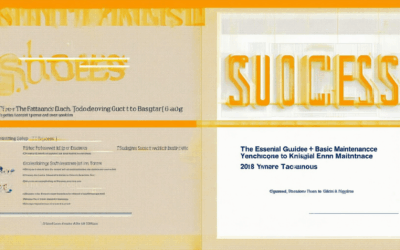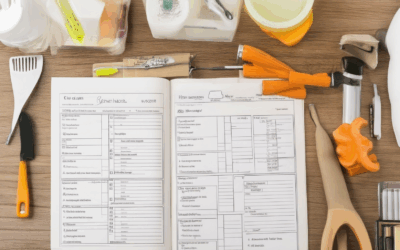As health-conscious individuals increasingly prioritize longevity and well-being, the importance of incorporating preventative care tasks into daily routines has never been more evident. These proactive measures form the cornerstone of maintaining physical health, emotional resilience, and overall quality of life. Whether it’s routine check-ups, adopting healthy habits, or preparing for potential challenges, understanding and implementing essential preventative care tasks can significantly influence one’s ability to thrive. This comprehensive guide delves into the key areas where these tasks matter most, offering actionable insights and practical advice to help you stay ahead of health concerns and embrace a more resilient lifestyle.
Key Preventative Care Tasks Everyone Should Prioritize
– Schedule Regular Health Check-Ups to Catch Issues Early
– Maintain Good Oral Hygiene for Dental Health
– Stay Updated on Vaccinations to Protect Yourself and Others
– Prioritize Mental Health for Emotional Well-being
– Adopt a Balanced Diet for Longevity
– Engage in Regular Exercise for Overall Fitness
– Practice Healthy Sleep Habits for Energy
– Manage Stress Effectively to Avoid Burnout
– Protect Your Skin and Environment from Harm
– Get Annual Screenings to Detect Problems Early
– Keep Your Home Maintained to Prevent Issues
– Plan Finances for Security
– Prepare for Emergencies
– Stay Informed with Regular Screenings

Common Preventative Care Tasks Every Individual Should Be Aware Of
Preventative care is essential for maintaining health and well-being. Here are some key tasks everyone should prioritize:
- Regular Health Check-Ups : Schedule routine appointments with your healthcare provider to monitor vital signs like blood pressure, cholesterol levels, and blood sugar. Early detection of issues can prevent serious conditions.
- Good Hygiene Practices : Wash hands frequently, brush teeth daily, and maintain clean living spaces to reduce the risk of infections and oral health problems.
- Nutritious Diet : Consume a balanced diet rich in fruits, vegetables, lean proteins, and whole grains to support overall health and immune function. Stay hydrated and limit processed foods.
- Home Maintenance : Regularly inspect and maintain your living environment. Check for potential hazards like loose wires, damaged pipes, or faulty appliances to prevent accidents and extend the life of your belongings.
- Emergency Preparedness : Create a readiness kit with essentials like a first aid kit, flashlight, and important documents. Knowing how to handle emergencies can save valuable time and reduce stress.
By incorporating these tasks into your routine, you can take proactive steps toward better health and longevity. Remember to consult professionals for specialized advice and stay informed about preventive measures tailored to your lifestyle.
Essential Preventative Care Tasks Everyone Should Prioritize
Preventative care is crucial for maintaining overall health and well-being. Here are the key tasks everyone should prioritize:
-
Regular Health Check-Ups
- Scheduled doctor visits for screenings and vaccinations.
- Blood pressure, cholesterol, and glucose monitoring.
- Dental exams and cleanings to prevent oral health issues.
- Eye exams to detect potential vision problems early.
-
Good Hygiene Practices
- Frequent handwashing to reduce infection risk.
- Oral hygiene, including brushing and flossing daily.
- Skin checks for moles, lesions, and skin cancer signs.
- Proper nail care to prevent infections.
-
A Balanced Diet
- Incorporate fruits, vegetables, lean proteins, and whole grains.
- Limit processed foods, sugary drinks, and unhealthy fats.
- Stay hydrated with plenty of water daily.
- Meal prep to ensure healthy eating habits.
-
Regular Physical Activity
- Aim for at least 30 minutes of moderate exercise most days.
- Activities like walking, jogging, swimming, or yoga.
- Strength training exercises to build muscle and bone health.
- Stay active to maintain mobility and flexibility.
-
Stress Management
- Practice mindfulness, meditation, or deep breathing exercises.
- Engage in hobbies or activities you enjoy.
- Seek support from friends, family, or professionals when needed.
- Avoid excessive alcohol, caffeine, or nicotine intake.
Additionally, consider:
- Maintaining a healthy weight to reduce chronic disease risks.
- Getting adequate sleep to support recovery and health.
- Using protective gear during physical activities to prevent injuries.
- Keeping emergency contact numbers handy for medical situations.
By prioritizing these tasks, you can take proactive steps toward a healthier lifestyle and enhance your overall well-being. Remember to consult healthcare professionals for personalized advice and stay informed about preventive care guidelines.
For more detailed guides and resources, visit our Health Maintenance Guide and explore our Diet and Nutrition Tips .

Crucial Preventative Care Tasks Everyone Should Prioritize
Preventative care is essential for maintaining health and wellness, whether it’s for the body, home, or finances. Here are the key tasks everyone should prioritize:
- Regular Health Screenings : Schedule routine check-ups, blood pressure checks, and cancer screenings based on age and health history. Early detection significantly improves treatment outcomes.
- Dental Hygiene : Regular dental exams, cleanings, and fluoride treatments help prevent gum disease and tooth decay. Replace toothbrushes every 3-4 months and use fluoride toothpaste.
- Mental Health Check-ins : Don’t ignore signs of stress or anxiety. Seek professional help if needed and engage in activities that promote mental well-being, such as meditation or hobbies.
- Home Maintenance : Inspect and maintain systems like HVAC, plumbing, and electrical components to prevent costly breakdowns. Replace air filters every 3 months and test smoke detectors annually.
- Financial Planning : Create an emergency fund, save for retirement, and regularly review financial statements to manage debts and investments effectively.
- Vehicle Care : Follow manufacturer guidelines for oil changes, tire rotations, and brake inspections. Keep records of maintenance for tax purposes.
- Food Safety : Practice safe food handling, storage, and preparation. Use refrigerators and freezers correctly and discard expired foods immediately.
- Fire Safety : Install smoke detectors and carbon monoxide alarms, and conduct fire drills to prepare families for emergencies.
- Emergency Preparedness : Create a readiness kit with essentials like first aid supplies, flashlights, and important documents. Know the locations of fire extinguishers and escape routes.
By prioritizing these tasks, individuals can reduce risks, extend lifespan, and enjoy a higher quality of life. Staying proactive ensures readiness for unexpected challenges and promotes overall well-being.

Preventative Care Tasks Everyone Should Prioritize
Preventative care is essential for maintaining health and well-being. Here are the most critical tasks everyone should prioritize:
- Regular Health Check-Ups : Schedule routine visits to your healthcare provider to detect potential issues early. Screenings, blood work, and physical exams can save lives by catching problems before they escalate.
- Dental Care : Good oral hygiene prevents gum disease and tooth decay. Brush twice daily, floss regularly, and visit your dentist for cleanings and check-ups.
- Vaccinations : Stay updated on immunizations, including flu shots, measles, mumps, and rubella vaccines. These prevent deadly diseases and protect vulnerable populations.
- Mental Health Check-Ups : Emotional well-being is as important as physical health. Seek professional help if experiencing anxiety, depression, or stress to maintain a balanced mindset.
- Diet and Nutrition : Eat a balanced diet rich in fruits, vegetables, lean proteins, and whole grains. Staying hydrated and avoiding processed foods reduces the risk of chronic conditions.
- Regular Exercise : Engage in at least 30 minutes of moderate exercise most days of the week. Physical activity boosts energy, improves mood, and helps maintain a healthy weight.
- Sleep Hygiene : Aim for 7-9 hours of quality sleep each night. Poor sleep can lead to fatigue, memory issues, and increased risk of infections.
- Stress Management : Practice relaxation techniques such as meditation, deep breathing, or yoga to manage stress effectively and reduce its impact on health.
- Protect Skin and Environment : Use sunscreen to prevent skin cancer and avoid harmful UV rays. Reduce exposure to pollutants and harmful substances in your environment.
Key Preventative Care Tasks Everyone Should Be Aware Of
Here’s a detailed breakdown of essential preventative care tasks everyone should prioritize:
- Regular Health Check-Ups
- Schedule routine medical appointments to catch potential issues early. This includes blood pressure, cholesterol, and diabetes screenings based on age and health history.
-
Vaccinations
- Stay updated on immunizations, such as flu shots, measles-mumps-rubella (MMR), and HPV vaccines. These prevent serious illnesses and infections.
-
Good Hygiene Practices
- Wash hands frequently with soap and water. Brush teeth daily and schedule regular dental check-ups. Inspect skin for changes like moles or suspicious spots.
-
Healthy Diet
- Consume a balanced diet rich in fruits, vegetables, lean proteins, and whole grains. Limit processed foods, sugary drinks, and excessive salt intake.
-
Exercise Routine
- Engage in at least 30 minutes of moderate exercise most days of the week. Incorporate activities like walking, jogging, swimming, or yoga.
-
Mental Health Management
- Practice mindfulness, meditation, or counseling to manage stress and anxiety. Building strong support networks can significantly impact overall well-being.
-
Sleep Management
- Aim for 7-8 hours of quality sleep each night. Establish a consistent sleep schedule and create a relaxing bedtime routine.
-
Avoid Harmful Habits
- Quit smoking and avoid secondhand smoke. Limit alcohol consumption and eliminate exposure to environmental toxins.
-
Annual Screenings
- Participate in regular cancer screenings, such as mammograms, pap smears, and colonoscopy, depending on age and risk factors.
-
Home Maintenance
- Conduct regular checks on plumbing, heating, and cooling systems. Inspect electrical outlets and fire hazards like chimneys and smoke detectors.
By prioritizing these tasks, individuals can take proactive steps toward better health and longevity. For further guidance on maintaining your home, visit Sams Maintenance or explore resources from trusted partners like Ace Hardware and Lowe’s .

Essential Preventative Care Tasks for Long-Term Health and Wellness
Preventative care is a cornerstone of maintaining long-term health and wellness. By prioritizing routine check-ups, adopting healthy habits, and implementing proactive measures, individuals can significantly reduce the risk of chronic diseases and overall health complications. Below are the essential tasks everyone should focus on:
- Mental Health Check-Ups : Regular mental health evaluations are crucial. Seek professional help to address stress, anxiety, or depression through therapy or counseling services. Maintaining mental well-being enhances emotional resilience and cognitive function.
- Regular Physical Exams : Annual check-ups with a primary care physician ensure early detection of potential health issues. Screenings for conditions like diabetes, hypertension, and cancer can lead to timely intervention and improved outcomes.
- Stress Management : Chronic stress can negatively impact both mental and physical health. Practice mindfulness, meditation, or yoga to manage stress effectively. Engage in hobbies that bring joy and fulfillment.
- Dietary Adjustments : A balanced diet rich in fruits, vegetables, lean proteins, and whole grains supports overall health. Reduce intake of processed foods, sugary drinks, and unhealthy fats to minimize cardiovascular risks.
- Regular Exercise : Incorporate at least 30 minutes of moderate exercise most days of the week. Activities like walking, jogging, swimming, or cycling not only improve physical fitness but also boost mental health.
- Sleep Hygiene : Aim for 7-9 hours of quality sleep each night. Establish a consistent sleep schedule and create a relaxing bedtime routine to ensure optimal rest and recovery.
- Home Maintenance : Regularly inspect and maintain your living environment. Schedule HVAC system tune-ups, plumbing checks, and chimney inspections to prevent costly repairs and ensure safety.
- Financial Planning : Create a budget and emergency fund to handle unexpected expenses. Consult with a financial advisor to set up savings and investment strategies for long-term security.
- Emergency Preparedness : Have a plan in place for emergencies, including a kit with essentials like water, food, flashlight, and first aid supplies. Stay informed about local disaster plans and evacuation routes.
- Regular Health Screenings : Keep up with vaccinations and screenings based on age and health history. Early detection of issues like skin cancer, mammograms, or colonoscopies can save lives.
By focusing on these essential preventative care tasks, individuals can take charge of their health and enjoy a higher quality of life. Consistency and awareness are key to achieving long-term wellness goals.




0 Comments